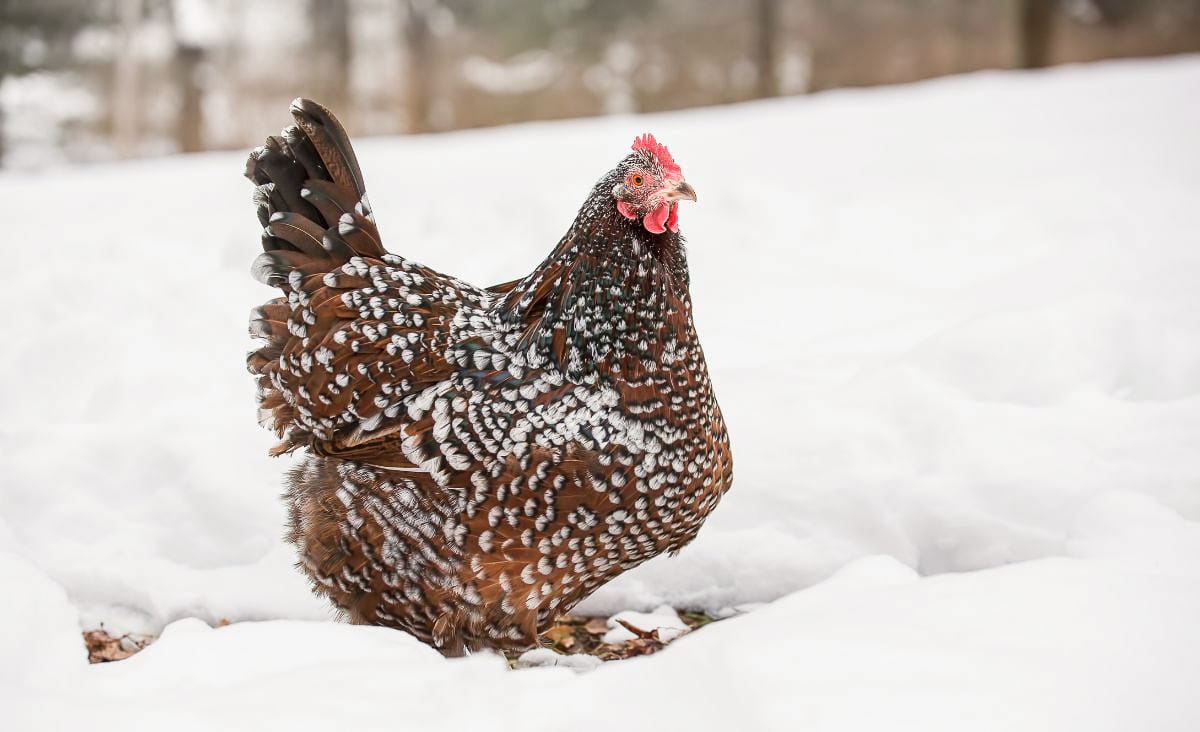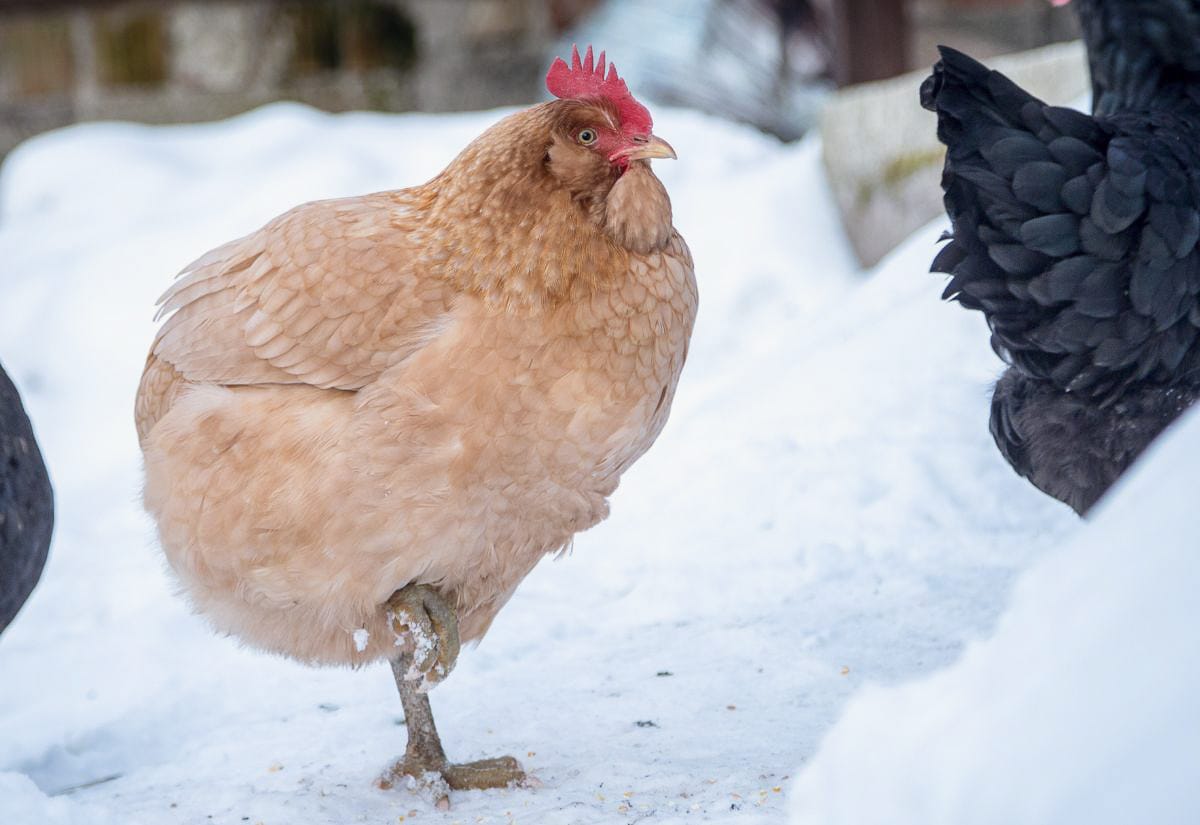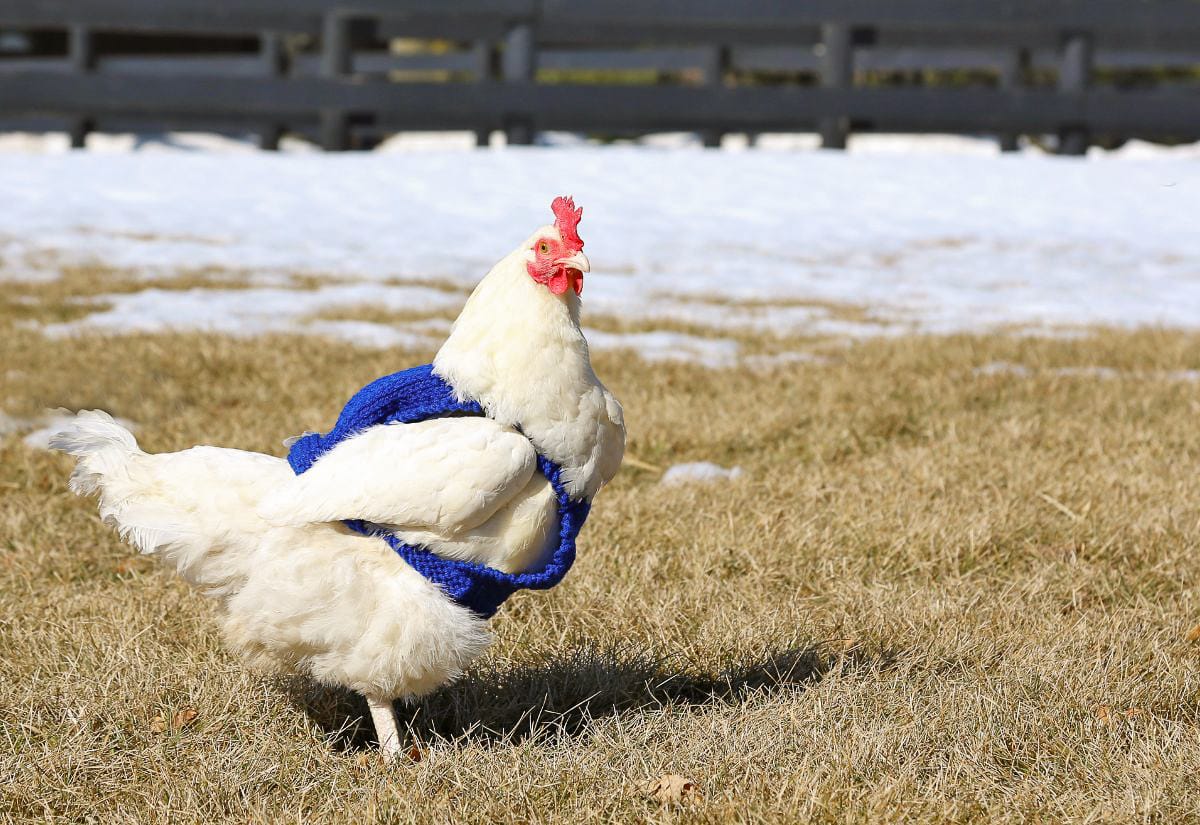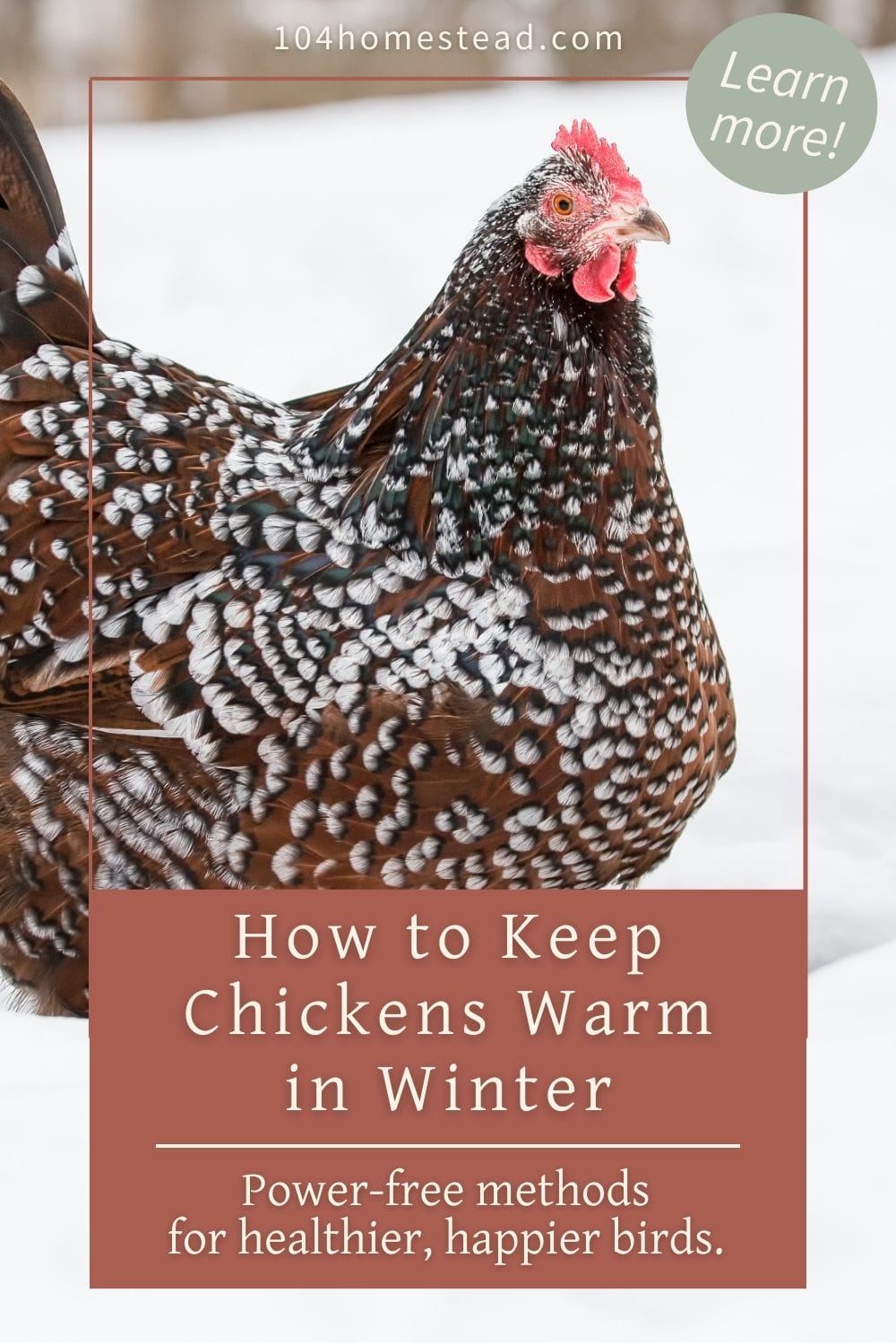How to Keep Chickens Warm in Winter Without Electricity
Learn how to keep chickens warm in winter without electricity using simple, proven methods. Winter setups that keep your flock healthy.

The start of winter hits differently when you’re a chicken keeper. After years of raising poultry through Maine winters, some of the coldest mornings in the state come right from my little valley, I’ve figured out that chickens don’t need a heated coop or anything. They just need a dry place to sleep, good airflow, and a setup that doesn’t let the wind blast them in the face.
If you’re trying to keep chickens warm in winter without electricity, here’s what has made the biggest difference for my birds. No heat lamps, no sweaters, no internet gimmicks. Just common-sense care that keeps your flock healthy all season long.
How Chickens Really Deal with Winter Temps
I meet so many new chicken keepers who are convinced their birds are one cold night away from hypothermia. Honestly? Chickens can handle way more cold than most people think. A healthy hen has a higher body temperature than we do, a built-in down jacket, and the ability to puff up her feathers like a little fluff ball to trap heat.
Some breeds are naturally cold hardy (Brahmas, Barred Rocks, and Salmon Faverolles, to name a few), but even the not-so-cold-hardy birds do just fine with the right setup. Cold isn’t the real problem; wet bedding and wind blowing right on them is.
If you want the bigger picture beyond chickens, I’ve got a post that breaks down how I get all my livestock ready for Maine winters.
So… How Cold Is Too Cold for Chickens?
Let’s get this part out of the way first:
- Above freezing: Chickens are totally comfortable.
- Down into the teens: Still fine if they’re dry and out of the wind.
- Single digits and below zero: This is where smart coop design really matters.
- Wind + wet bedding + humidity: This is what causes frostbite (not just the temperature).
If you notice comb tips looking pale or a little darkened, or birds looking damp or squeezed into a tight pile during the day, they’re cold. Not an emergency, but it means something needs adjusting.

How to Keep Chickens Warm in Winter Without Electricity
These are the practical steps I follow every winter on my homestead. No heaters. No power. Just what I’ve found that works.
A Dry, Draft-Free Coop That Breathes
If you get nothing else perfect, get this part right. Chickens don’t need a warm coop. They need a dry one. I check for:
- Cracks at roost height
- Gaps where wind sneaks in
- Leaky windows
- Wet bedding or condensation
If you stand in the coop and feel a breeze on your face, that’s a draft. Patch that. If the windows fog up heavily, that’s a sign the coop isn’t venting enough. Open a vent up high, never at bird level. Warm, moist air rises, and that’s the air you want to escape.
Good airflow prevents frostbite better than anything else you’ll do.
Use Bedding That Stays Dry
Winter bedding is doing two jobs: keeping birds off the cold floor and controlling moisture. These days I use coarse sand in the coop because it drains well, doesn’t hold moisture the way organic bedding does, and makes it easy to spot-clean even in January.
If sand isn’t your style, you still have other solid options:
- Straw (especially helpful in nest boxes during the coldest months)
- Coarse shavings
- Deep litter, if you start it early and manage it well
Deep litter can throw off a little warmth as the lower layers break down, but it only works if it stays dry and well-aerated. If the coop ever smells like ammonia, add fresh material and increase ventilation. Whatever you use, keeping it dry matters most.
Set Up Winter-Friendly Roosts
Roosts aren’t just “sleeping bars.” They’re how chickens protect their toes from frostbite. I use:
- 2×4 boards laid flat
- Roosts all at the same height so nobody’s fighting for the warmest spot
- Enough space for everyone to sit shoulder-to-shoulder
When chickens roost flat-footed, they cover their toes with their chest feathers (built-in insulation).

Give Them a Cold-Weather Space Outside
Some chickens hate snow. Others stomp right through it. But none of them complain about having a dry place to stand. Simple things that help:
- Wrap part of the run with clear plastic to block wind and snow accumulation
- Add straw paths so they’re not walking on bare ice
- Set up a few low perches or pallets to get their feet off the frozen ground
If your birds free range, winter doesn’t have to stop that. I talk through how I handle free-ranging in snow in this post. The more they’re up and moving, the warmer they’ll stay, so make it easier for them to get out and explore.
What to Feed When the Temps Drop
Winter is not the time to overhaul your feed plan. Their regular complete feed should still be the bulk of their diet. In colder weather, I like to:
- Leave feed available at all times
- Give a small scratch or cracked corn snack late afternoon
- Use high-fat treats like black oil sunflower seeds sparingly
- Offer warm mash only when needed to encourage appetite
It’s tempting to load them up with extras, and it doesn’t help that the internet is full of “must-make” winter mash ideas. If you’re curious about the pepper myth, I get into all of that in my post on what I’ve learned about using red pepper flakes in winter. Short answer… it’s not the miracle people online make it out to be.
How I Keep Water from Freezing
Water is honestly the hardest part of winter chicken keeping. Chickens drink the most first thing in the morning and again toward evening, so those are the times you want liquid water available. If your winters regularly dip below freezing and you do have electricity, a good heated waterer makes winter chores a lot less annoying. I’ve used a few styles over the years, but these heated poultry waterers have held up and hold a good amount of water. If you don’t have electricity, you can:
- Use rubber bowls (easy to dump ice from)
- Place water in the most sheltered spot you have
- Bring out warm (not hot) water a few times a day
- Use deeper containers rather than wide, shallow ones
- Swap waterers between indoors and outdoors
I break down all of these methods (and a couple of odd little tricks I rely on) in my guide on how I keep livestock water from freezing. You just need it liquid long enough for everyone to drink.
What Chickens Don’t Need This Winter
This is the bit that makes beginners nervous, but it’s also where you can relax a little.
No Heat Lamps or Constant Heating: Heat lamps are famous for causing coop fires, but even if you ignore that risk, the temperature swings can be brutal if the power goes out. Birds that are allowed to slowly acclimate to winter stay healthier than birds kept artificially warm.
If your coop is dry, ventilated, and wind-protected, your flock will adapt naturally.
No Chicken Sweaters: A sweater presses down the very feathers they rely on to stay warm, traps moisture, and rubs on pin feathers during molting. The idea is cute. The reality is uncomfortable for the bird.

Fixing Common Winter Issues
Even if you feel like you’ve got it handled, winter has a way of pointing out the gaps. Here are the most common issues I see in winter and what to do about them.
- Frostbite on comb tips: Open a vent higher up, add extra bedding, and patch drafts at roost height.
- Wet bedding or ammonia smell: Add fresh straw or shavings and increase ventilation. Moisture is the enemy here.
- Birds piling during the day: Give them more wind protection or add straw “islands” outside. Piling at night is normal; piling during the day means they’re uncomfortable.
- Eggs freezing: Gather more often, use deep straw in nest boxes, and make sure boxes aren’t catching drafts.
Still Sorting Out Your Winter Setup?
These are the questions I hear the most once winter rolls in.
Live in a cold climate? Pin this so you’ll have it handy when the temps start to dip.

Once you know what really matters, keeping chickens warm without electricity isn’t nearly as complicated as it sounds. Dry air, draft-free roosts, consistent water, and a little common sense will carry your flock through even the harshest weeks of the season.
And if you need help surviving spring’s mud season, I’ve got you covered there as well.
If you’ve found a winter habit or trick that works well with your flock, I’d love to hear it.
